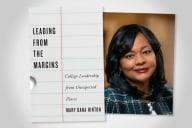You have /5 articles left.
Sign up for a free account or log in.
A graduate seminar at Princeton University, Interdisciplinarity and Antidisciplinarity, has produced an unusual new book that offers definitions for key terms in academic life. The definitions are only somewhat literal and contain plenty of jabs at the way colleges and universities are run. The idea, as the introduction explains, is to build on the tradition of such works as Raymond Williams’s Keywords: A Vocabulary of Culture and Society and Ambrose Bierce’s Devil's Dictionary. Three members of the group of Princeton professors and graduate students from the seminar who wrote the new book say that it “looks a bit like a Tom Paine-era pamphlet, with a broadsheet-style cover and one of those endless titles favored by revolutionaries and crackpots: KEYWORDS; for Further Consideration and Particularly Relevant to Academic Life, Especially as It Concerns Disciplines, Inter-Disciplinary Endeavor, and Modes of Resistance to the Same.”
The book is out this month from Princeton University Press. Three members of the self-described "community of inquiry" that jointly came up with the definition also served as the book's editors. They are D. Graham Burnett, a historian of science at Princeton, and two doctoral students in English at Princeton, Matthew Rickard and Jessica Terekhov. They responded to email questions about their new book.
Q: How did you turn the work of the seminar into a book?
A: Graham initially raised the idea of our doing some sort of collective final project in the class -- rather than everyone writing his or her own “term paper.” There was a shared sense that after a semester of thinking about the disciplinary architecture of academic life (and the way this architecture canalizes intellectual labor and cabins intellectual aspiration) it seemed sort of perverse to let all of us use the final paper as a way to write some or another subsection of a dissertation chapter. That encroaching specter goaded us to explore alternatives. We’d kept a running tally of “key terms” across the semester, and the idea of working together on definitions for those terms emerged as a final exercise that could both résumé the terrain we had covered, and look forward toward some rethinking. Graham offered to help, if the project gained momentum. So we divvied up the list of terms we had on hand, and everyone in the class, including the instructors, drafted five definitions. That was our final class work. Then a group of us volunteered to continue work on the project over the summer. Upgrading our manuscript into a printed text (and, we hoped from the outset, a digital forum, too) was a way of increasing its visibility and urging broader discussion of the virtues and vices of disciplinary labor. This was what we had in mind as editors as we massaged the entries into an actual manuscript over the course of the summer. The draft saw countless rounds of substantive revision and a lot of integral graphic design work before it surprised the editorial team as a legitimately publishable object. Our plan had simply been to self-publish, and to hand the thing around like a pamphlet, but we were delighted when Princeton University Press got interested, and decided to give the project a wider release.
Q: Were there any possible words for inclusion that you rejected?
A: The published version of KEYWORDS; … Relevant to Academic Life, &c. includes definitions for roughly half of the close to 100 terms pooled by our class across the term, plus another handful of words introduced by the editors in revisions. So lots of the terms we discussed in the course didn’t ultimately make it into the book as it stands. The majority that were left on the cutting room floor just weren’t picked by any of us to define as part of the final class exercise. But a few entries dropped out of the manuscript over the summer, and others were added during the editorial process -- all of which underscores the fluidity of our keywords compilation and the openness of the conversation around it.
The whole thing was a kind of experiment in collective authorship. Most of the entries were rewritten so many times in the process that no one felt a strong sense of individual ownership over the text. But the entire manuscript did circulate to all authors twice as the process wound to a close. The first round gave everyone a chance to pull out of the manuscript any text or bit of text to which any author felt attached in an “intellectual property” way. Then the text made another round with a call for opt-outs: if you did not want your name on the text as a whole, all you had to do was say so. But there were no takers on either of those options, which we felt reflected in a practical way the crystallizing of our joint identity as a “community of inquiry” (however utopian that might seem). It’s worth adding that we hardly think of this book as finished. One of the reasons we put a lot of work into the website for the book is that we would like to see the project expanded and revised over time. The book as it stands emerged out of the intellectual community of Princeton’s Interdisciplinary Doctoral Program in the Humanities (IHUM), at the center of which is the critical investigation of disciplinary structures. An ongoing effort to articulate a lexicon for this enterprise feels like key work. In fact, the back end of the website is a sort of wiki that we hope will be used by future IHUM students and faculty to “version” the KEYWORDS project in the years ahead.
Q: Did you consider such words as “dean” or “administrator” or “president”?
A: Oddly, no. The class did consider having an administrator speak to our seminar -- which invited faculty from humanities departments across campus to visit throughout the term -- but we ultimately decided against this idea as well. Given that our project generates a good deal of energy from friction with academic bureaucracy, it may seem a curious omission. Rather than sustained reflection on university administration, however, KEYWORDS queries terms that academics are liable to find useful, informative and more-or-less adequate to scholarship. But the omission of terms like “dean,” “administrator” and “president” also speaks to something fundamental about our collective ambition. It’s common to hear university administrators encourage graduate students to perform interdisciplinary work in order to make them competitive applicants in an increasingly exigent job market, the idea being that students who can teach (or better yet, publish) in multiple fields are likelier to appeal to colleges and universities trying desperately to cover the same amount of labor with fewer full-time employees.
Writing as thinkers who care about interdisciplinarity in general, and the IHUM program in particular, we feel that the promotion of “interdisciplinarity” as a line item on your CV does considerable damage to the potential for meaningful work under its auspices. By treating interdisciplinarity as another accolade in the endless pursuit of incremental advantage, we risk subjecting academic experimentation to the same protocols as disciplinary inquiry, albeit with less judiciousness. That’s why the entry on “irony” says that interdisciplinarity is not “more knowing” but “less”: while we admire (and practice!) the intellectual activity that flourishes within disciplinary constraints, we also want to shelter interdisciplinarity -- or perhaps it is antidisciplinarity that we mean -- from the dynamics that would assimilate it to business as usual within university life.
Q: Many of your definitions move from a straightforward definition to some zingers about the current state of academe (the definition of university, for example). What drew you to that pattern?
A: It’s true that several entries begin with straightforward definitions that resolve themselves into critical slash or irreverent wit. The short definitions are especially guilty of this. The po-faced sincerity mostly sets up satire. Many of the entries play fast and loose with the notion of “definition” itself, the genre of the text providing excellent cover for our exploration of terms in their tangled, ignoble histories. The tone of KEYWORDS was perhaps not as clear from the start as it is now. In the course of revisions, we came to see the text less as handbook for navigating the 21st-century university and more as a cri de coeur about where we’re heading. Yes, the text is a little savage, here and there. But this is the savagery of passion, not indifference, and certainly not contempt. We’re not especially shy about the fact that we think universities can do better, that they should cultivate the sense of vocation that is the reason we were called to academia in the first place. The humanities are held up for scrutiny, ridicule, plaint, censure, laughter and, every so often, macabre delight. But we are, all of us, absolutely creatures of the university, even as we chafe against its economizing drift; and we are each, in our own ways, convicted by aspects of life here. The ironies are not lost on us: we feel that it is the greatness of universities that they are willing to have their hands bitten by those they feed; it testifies to the fact that these institutions have higher ideals than raising compliant livestock. We hope that KEYWORDS bears witness to our belief that it’s possible to push open spaces for wider reflection and more exacting self-scrutiny within the very special setting of academic life.
Q: If you had to pick one or two definitions as favorites, which would they be and why?
A: Oh, each of us has a few secret loves! Let’s see … “occupational hazard” is a good one. It speaks, perhaps, to the uncanny resemblance between conformity and critique. The associated image, for what it’s worth, depicts the blind spots generated by trauma to specific regions of the visual cortex. And “excellence” is cruel, but in a way that feels important -- and maybe even salutary within the debilitating hyperprofessionalism of grad-student life. And faculty life, too, for that matter! At the center of the book as a whole is a kind of tacit argument that the humanities cannot assimilate themselves entirely to the model of knowledge production prevalent within the sciences -- without forfeiting something important about humanistic inquiry. In a basic way, we share the view that the humanities aren’t ultimately most deeply “about” knowledge production. But this is a pretty radical claim. Our definition of “knowledge production” goes to the heart of the matter: “The means to and/or end of academic life (see irony).”








